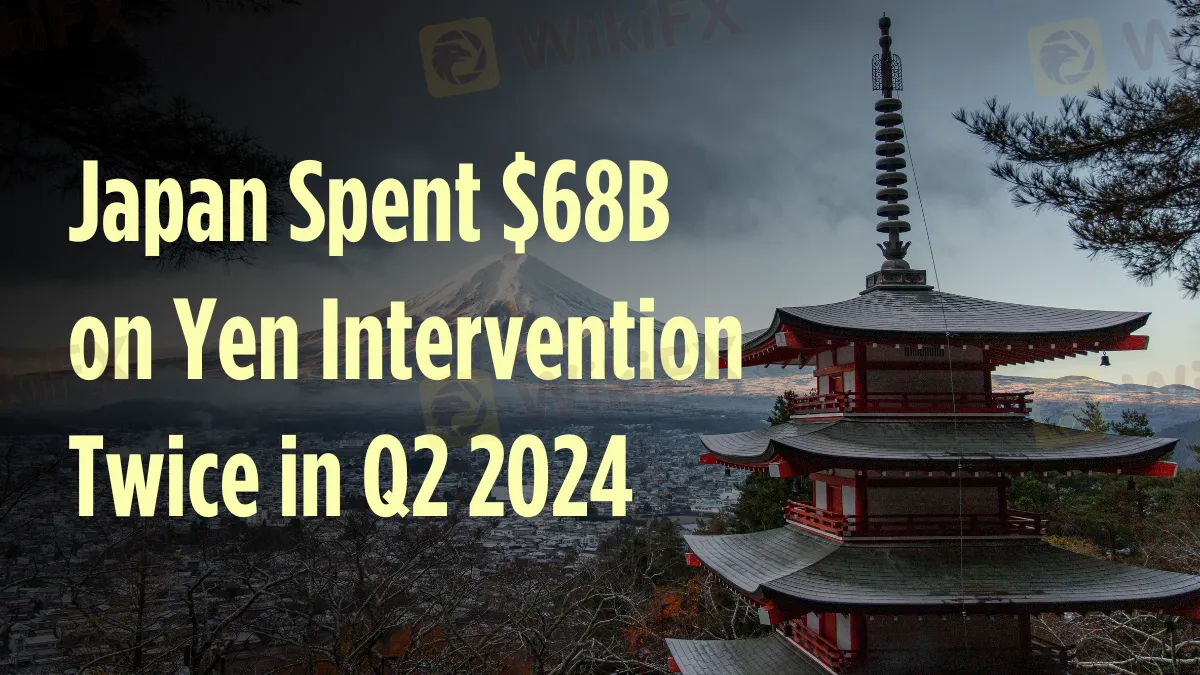简体中文
繁體中文
English
Pусский
日本語
ภาษาไทย
Tiếng Việt
Bahasa Indonesia
Español
हिन्दी
Filippiiniläinen
Français
Deutsch
Português
Türkçe
한국어
العربية
Japan Spent $68B on Yen Intervention Twice in Q2 2024
Abstract:Japan spent $68 billion on yen interventions in Q2 2024. Despite record spending, the yen's recovery was brief, with recent rate hikes aiding its strength.

In the second quarter of 2024, Japan made major foreign currency market interventions, spending a record $68 billion to stabilize the yen. The Ministry of Finance carried out these measures on April 29 and May 1, according to a comprehensive report issued Wednesday.
Japan spent about ¥5.9 trillion (about $40.6 billion) on April 29 and ¥3.9 trillion on May 1. This large spending was intended to maintain the yen, which had fallen to its lowest level in decades. Despite these significant financial efforts, the interventions had only a brief impact and did not alter the fundamental market trend.

The report also stated that no other interventions happened after these two dates. According to previous estimates, Japan may have sold US Treasury bonds and other foreign assets to fund these actions. However, the immediate effect of these actions could have been more minimal. However, they did temporarily prevent some investors from betting against the yen due to concerns about future action.
To maintain the yen, Japanese policymakers spent an extra ¥5.5 trillion last month. A complete summary of these most recent measures is scheduled to be issued in November.
As Japan's attempts to reverse the yen's drop come to a close, the currency has lately exhibited a robust comeback, backed by a shrinking interest rate disparity. Last Monday, the Bank of Japan increased its policy rate by 0.25 percentage points to 0.1% and announced a decrease in asset purchases. Following recent market disturbances, there is also speculation that the Federal Reserve would decrease interest rates by a higher amount than predicted.
Stay updated on Japan's $68 billion yen intervention and other financial news by visiting WikiFX's news page for the latest insights and reports.

Disclaimer:
The views in this article only represent the author's personal views, and do not constitute investment advice on this platform. This platform does not guarantee the accuracy, completeness and timeliness of the information in the article, and will not be liable for any loss caused by the use of or reliance on the information in the article.
Read more

The Hidden Checklist: Five Unconventional Steps to Vet Your Broker
Forex broker scams continue to evolve, employing new tactics to appear credible and mislead unsuspecting traders. Identifying these fraudulent schemes requires vigilance and strategies beyond the usual advice. Here are five effective methods to help traders assess the legitimacy of a forex broker and avoid potential pitfalls.

Doo Financial Obtains Licenses in BVI and Cayman Islands
Doo Financial, a subsidiary of Singapore-based Doo Group, has expanded its regulatory footprint by securing new offshore licenses from the British Virgin Islands Financial Services Commission (BVI FSC) and the Cayman Islands Monetary Authority (CIMA).

CFI’s New Initiative Aims to Promote Transparency in Trading
A new programme has been launched by CFI to address the growing need for transparency and awareness in online trading. Named “Trading Transparency+: Empowering Awareness and Clarity in Trading,” the initiative seeks to combat misinformation and equip individuals with resources to evaluate whether trading aligns with their financial goals and circumstances.

Malaysian-Thai Fraud Syndicate Dismantled, Millions in Losses Reported
The Royal Malaysia Police (PDRM) has received 26 reports concerning the Nicshare and CommonApps investment schemes, both linked to a major fraudulent syndicate led by a Malaysian citizen. The syndicate’s activities came to light following the arrest of its leader by Thai authorities on 16 December.
WikiFX Broker
Latest News
ASIC Sues Binance Australia Derivatives for Misclassifying Retail Clients
WikiFX Review: Is FxPro Reliable?
Malaysian-Thai Fraud Syndicate Dismantled, Millions in Losses Reported
Trading frauds topped the list of scams in India- Report Reveals
YAMARKETS' Jingle Bells Christmas Offer!
AIMS Broker Review
The Hidden Checklist: Five Unconventional Steps to Vet Your Broker
WikiFX Review: Something You Need to Know About Markets4you
Revolut Leads UK Neobanks in the Digital Banking Revolution
Fusion Markets: Safe Choice or Scam to Avoid?
Currency Calculator


